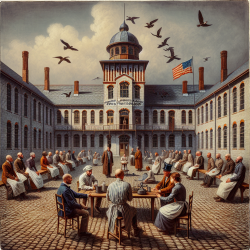Understanding the Complexities of 19th-Century Asylums Through the Lens of Food
The research article titled "Dirty Bread, Forced Feeding, and Tea Parties: the Uses and Abuses of Food in Nineteenth-Century Insane Asylums" provides a unique perspective on the role of food in the treatment and management of patients in asylums during the 19th century. This historical analysis reveals the complexities and contradictions inherent in the moral treatment approach, which can offer valuable insights for modern practitioners.
The Role of Food in Moral Treatment
In the 19th century, psychiatrists believed that food played a crucial role in the moral treatment of patients. They associated proper dietary habits with moral values, drawing on ancient and early modern knowledge that linked diet to both physical and mental health. This belief system was structured around bourgeois moral values that emphasized self-discipline and productivity.
The asylum was seen as a moral machine designed to transform patients into "decorous" citizens. However, the implementation of these ideals often fell short, leading to contradictions and failures in treatment. The research highlights how food was used as a tool for both control and rehabilitation, revealing the fault lines in the asylum's ideological structure.
Lessons for Modern Practitioners
For modern practitioners, especially those working with children, understanding the historical context of moral treatment can provide valuable insights into the complexities of mental health care. The research underscores the importance of considering the individual needs and backgrounds of patients, rather than imposing a one-size-fits-all approach.
Practitioners can learn from the past by:
- Recognizing the importance of individualized care and the potential harm of rigid treatment models.
- Understanding the historical context of mental health practices to avoid repeating past mistakes.
- Emphasizing empathy and understanding in patient interactions, acknowledging their unique perspectives and experiences.
Encouraging Further Research
This research highlights the need for continued exploration into the historical and social contexts of mental health treatment. By examining the past, practitioners can better understand the present and improve future outcomes for patients, particularly children.
To read the original research paper, please follow this link: Dirty Bread, Forced Feeding, and Tea Parties: the Uses and Abuses of Food in Nineteenth-Century Insane Asylums.










